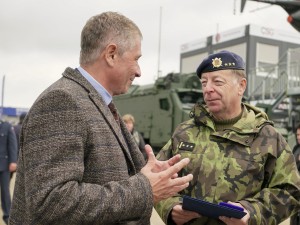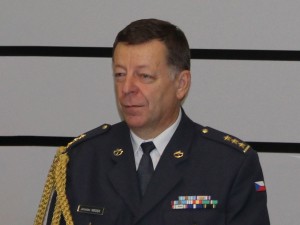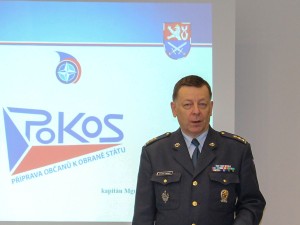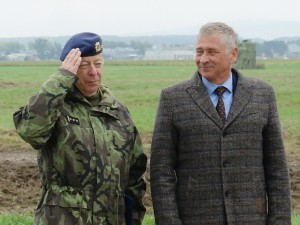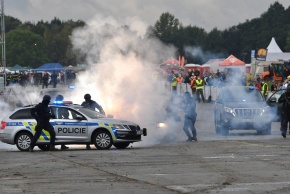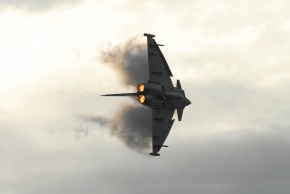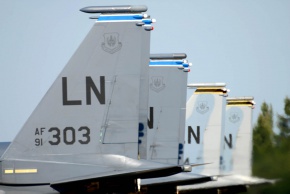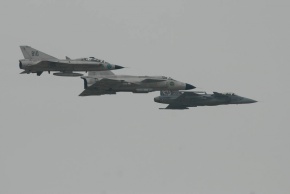News
I have been lucky to meet the right people // Humans of NATO Days
The Ostrava Regional Military Command is one of the units that have been participating in NATO Days in Ostrava since the first years. Nowadays, many people have these territorial army units associated mainly with active reserve units. We talked to Col. Jaroslav Medek, Director of Ostrava Regional Military Command.
You have had an impressive military career, you studied military school in Slovakia. How was your journey to the head of the Ostrava Regional Military Command?
It was really long. In the third year at the industrial school, the soldiers came to visit the school and offered the opportunity to learn about the military profession. I was quite interested in it at that time, so I took part in a familiarization trip to Liptovský Mikuláš, where I finally entered the university in 1982. I graduated with a degree in air defence, specialising in automated command and control systems. I graduated in 1987. I joined my first unit near Prague in Slaný, and that's where I started my military career. Then came the impulse to move somewhere else, because the soldiers have it so that they often move. And I got back to Moravia, to Brno, where I started my career first as a technician, and then I moved into command positions. From technician I became a company commander, then deputy battalion commander, and finally battalion commander. And I worked in the position until the year 2000, when it was decided that the air defence of the country would be toned down, and we had to find a new place.
At that time, I applied for my first selection procedure, at the Military Academy in Brno, where I joined the Department of Air Defence of the State. I started working as an assistant professor and continued teaching at the military high school in Brno. When the Training and Doctrine Command in Vyškov was established in 2003, I was offered to transfer there. There, I served as the chief of the radio technical troops, which means that I was in charge of training radar operators. Gradually I moved to the position of head of the department, then I became the chief of staff, I started to manage things on a larger scale.
I left the Training Command – Military Academy in 2019 as chief of staff. That's basically the third highest position that exists in any department. We were a fairly large facility because in addition to being a reserve training facility, we also had three military training facilities under our command – Libavá, Boletice, and Doupov. In addition to that, we had a simulation and simulator technology centre under our control. In that year, 2019, I applied for another selection procedure, in which I succeeded – here in Ostrava. So, since the end of 2019, I have been the director of the Ostrava Regional Military Command, and I have been performing military tasks here in Ostrava.
This interview is published on 17 November. How do you remember the revolutionary time 35 years ago?
Well, it's been a very long time. But by the fact that the soldiers had always been put outside of these things, so of course we reacted to it in such a way that we were familiar with what was going on, what was being prepared, it provoked a whole range of emotions even in us soldiers, because we were used to being in barracks or in training areas, and suddenly there was something new happening. Everybody had hopes that it would bring something better, and I would say that a lot of our hopes were probably fulfilled.
New things appeared, some things disappeared, which is perhaps to the detriment of the cause, because I think that in many areas the Czech Republic, or the republic that preceded it, was at the top – whether it was agriculture, engineering, or industry. After the revolution, of course, there was a group of people who wanted to make the most of it. This opened up business opportunities, some succeeded, some unfortunately, because they had no experience, went bankrupt. A lot of soldiers at that time decided to end their mission as a soldier, they went into civilian life and started to make a living as civilian employees, found their own positions, started their own companies. Some successfully, some unsuccessfully. I have a friend who left the chemists unit back then and now has a large hazardous waste disposal company. I think he's very successful, he's well known, so it's brought something to everybody.
In the beginning when we went into that civilian life, of course we didn't know what to expect because we were enclosed in the bubble of that military training area or barracks, and we were waiting to see what was going to happen. As I mentioned, it gave a lot of people new horizons, but then a lot of people found out that they were going to go back and continue to be a professional soldier.
The army's communication to the public has changed a lot since then, it presents itself more, it tries to get closer to the public. What is your military view on this subject?
It has changed very significantly now in that the citizens have stopped meeting us completely at some points. Because our political leaders at the time decided that there was no need for us to have such a large military, that we are a much smaller country, and by joining NATO in 1999, we got a little bit carried away with the fact that because we are involved in the largest defence organization in the world, we don't need to have that many troops. And that's why in a lot of cities the soldiers have completely disappeared. A classic example is the Moravian-Silesian Region, where, apart from the 30 soldiers who work with me at the Ostrava Regional Military Command, the only place you will see soldiers is in Opava. Then there is a small group in Hlučín, and then there are only such garrisons as Hostašovice or Háj ve Slezsku, but the soldiers are almost invisible.
So in this respect, we are quite happy that the POKOS activity - preparing citizens for the defence of the state - is being launched again, where in cooperation with primary and secondary schools, within the framework of educational projects, we go to schools and tell children, who the soldiers are, why they are here, what tasks we are performing, that we are not only performing them here in the Republic, but that in many cases we are also performing these tasks outside the Republic to help protect those things that we wanted to gain from the Velvet Revolution.
The younger people no longer experienced conscription exercises at schools, Ostrava Regional Military Command is the coordinator of the POKOS project. How has the training of citizens changed in that time?
It has changed a lot because in those days before there used to be a subject called conscription education where they used to teach the things that we say today in POKOS. We try to explain to children why we have soldiers, why the army as such exists, that there is an integrated rescue system and that soldiers are one of its complementary components, and that is why you can meet us in all kinds of disasters, when we are always happy to welcome soldiers.
What has changed is that it used to be part of the curriculum in primary and secondary schools and it was taught everywhere. Today, as part of POKOS, we go to selected schools that sign up and say they are interested. In order to help those schools to also fulfil the issues of the framework curriculum, we are training primary and secondary school teachers to know what they can tell children about the army. To do this, we organise training for teachers several times a year. They always come here with distrust, and then it almost seems that they would rather not leave, because what they learn here surprises them in many cases. Even they, who are closer in age to us than the children, are surprised at all the tasks the army performs.
In order to get even closer to the citizens, and especially to children, we also organize in the Moravian-Silesian Region a defence-security and knowledge game Wolfram, which was created as a reminder of the Wolfram paratroopers, when on 14 September 1944 a group of paratroopers was dropped here to fight against the Germans and contributed to the defeat of Germany. The Wolfram competition has had a great response. We organise 12 regional rounds in primary and secondary schools, and then we have a regional round which takes place at the military training area in Libavá, where we have a whole series of other competitions for children. In many cases, they are surprised by the tasks they perform. For some schools it has become a prestigious thing to take part in Wolfram. Maybe it's a bit like the Partisan Machine Gun competition that used to run in the past. We also used to do tasks with soldiers, there used to be summer military camps with soldiers. Nowadays, in fact, even during the holidays, when the children are not in school, we go to the camps and there we introduce them again to the materials we use, we show them how to survive in nature, how to make a fire, how to get clean water so that they can drink it, how and what to avoid, we teach them how to navigate in nature so that they know how to find the north and so on.
Since then, we have completely reoriented from the Warsaw Pact to the North Atlantic Alliance. Can you assess the significance of 17 November in the context of defence and the military?
That is more a question for our political leaders. In any case, as I mentioned at the beginning, this reorientation towards the largest defence alliance in the world gives us a greater sense of security that everything will be all right. Today, we see that there is a conflict going on in Ukraine, for example, but there are conflicts all over the world, so we need to protect the good people, the right people. That is what the soldiers are here for and should contribute to. We are carrying out a stabilising task.
When the war in Ukraine started, a lot of people realised that being in NATO really makes sense.
I think a lot of politicians realised that too. What President Trump has been advocating, that every country, every member of the Alliance should give 2 % of GDP to its defence - the war in Ukraine has shown all those countries that you really need to do that. While the conflict was going on somewhere in Afghanistan, which is 10 000 kilometres away, it was almost like being on another planet. Whereas now it is happening here, and you can see that investment in the army is taking place. We have acquired a whole range of new modern things that we are learning to use and we have to learn to use them in the best possible way so that we can use them effectively in any defence. Sure, hopefully we won't need them, but those who are prepared are not caught off guard.
The active reserve also falls under the Ostrava Regional Military Command. How interested are people in getting involved in the defence of the Czech Republic in this way?
The Moravian-Silesian Region is a region that has been used to hard work and has always been used to making sure that everything works well. I would say that in the Moravian-Silesian Region we have an excellent interest of the citizens in the defence of the state as such, and the amendment of the Conscription Act and the Act on Active Reserve Soldiers opens up further opportunities to get involved in defence. A citizen can become a professional soldier, that is one option. The second option is to be an active reserve soldier, and the third option is to come to a voluntary military exercise, try it out and say, 'Well, this is what he would like to do' or 'This is not for me', and then we are completely finished with that person. And the last option is voluntary predestination. This is for people who would like to be involved in the defence of the Czech Republic, but at the moment their work commitments do not allow them to do so. As a rule, they are specialists of some kind – electrical engineering, power engineering, mechanical engineers, computer technicians. These people can decide to come to a recruitment centre, then they come to us, we find them a suitable job according to their skills and abilities and we draw up a contract with them that, if necessary, these people will come and join the defence in those appropriate places.
Just like in civilian life, we have a range of modern technologies that we use. We use social networks, which can be very positive, but they can bring a lot of negative things, because in many cases people today rely on what is said on a social network to be 100% true. They have stopped checking information from other sources to rule out the possibility that it is not fake news that someone is spreading as part of a disinformation campaign and trying to manipulate public opinion in a certain direction. The fact that there are social networks here, that we have the internet, makes it relatively easy. You have to be very cautious about what you read and what someone is trying to tell us is true. That truth may be somewhere in the middle.
But to get back to the question, there is a lot of interest in active reserve. We, as the Regional Military Command, have almost 500 people registered in the active reserve who live here in the Moravian-Silesian Region. Some of them are directly assigned to the active reserve at the Regional Military Command, we have two units. We regularly carry out military exercises with these citizens, and we are currently preparing for a military exercise at the end of November and the beginning of December, when we will practise protecting some of the critical infrastructure objects. We will review with the soldiers the safety rules of using a weapon so that they are safe, but so that we, the soldiers, are safe as well. So, there is a lot of interest here, and I think that anyone who is interested in doing something for the Czech Republic should sign up and try active reserve. It doesn't oblige them to do anything, and it brings them some benefits, they make new friends, they learn a lot of new skills, and it brings them new financial appreciation, which, after all, can all be read beautifully in the laws.
You mentioned social networks. The use of them and the use of artificial intelligence is fascinating and frightening at the same time.
Yes, it's a bit like Terminator, where the AI is starting to master these things. And if you look at the fact that AI was able to put together a document some time ago, it was able to fill things in, but today it's painting, it's composing music and it's able to create messages that are so realistically rendered that you can't tell that it's all computer generated. It's really very dangerous in that way.
Active Reserve soldiers probably contribute a lot to spreading awareness of the Czech Army when they talk to their civilian acquaintances, right?
That's the best advertising - the guys who come with us to these military exercises. The ads we do on social media, of course, are important in recruitment. We go to public events, we organised a Day with Heroes last year and the year before, where the whole integrated rescue system met. That also serves as a recruitment tool for the various units, but the personal experience that I will tell you, because I have tried it, is 100% more credible to the average person than the information that I read in the media or see on the internet. There they read that active reserve soldiers have trained somewhere and they think - if they wanted to, they trained. It lacks personal experience.
As Director of the Ostrava Regional Military Command, you are, among other things, a member of the Safety Commission and the Commission for the work of the Integrated Rescue System. How does the cooperation with others - police, firefighters, rescue service - take place?
I have to say that here in our Moravian-Silesian region - I am not from the region, it is one of my destinations where I am serving as a professional soldier - I have found that there are communicative, hard-working people here who, when they have a problem, try to solve it together. Shortly after my arrival in 2019, covid began to plague us. During that time, we addressed a number of issues within the security committees. How to help the people who were sick, how to help the health workers who were sick and were supposed to take care of those citizens in turn. I have found that the synergy within the integrated rescue system works very well here.
The Crisis Staff is always headed by the Governor, and whether it was Mr Vondrák or whether it is now Mr Bělica, the tasks are always issued clearly and comprehensibly to the units that are supposed to do the work. And if we don't know something, or I am given a task that I don't know how to do, I ask the firefighters or rescue workers and we always find a solution. The classic example of cooperation, as I mentioned, was covid. Then it was migration. Well, and now more recently we have dealt and are still dealing with flooding. All the services have been involved in dealing with the consequences of the floods through crisis management. There are still about 180 soldiers and 70 pieces of equipment deployed in the region. We are trying to help those municipalities that have been most affected, so that the consequences can be eliminated as much as possible, because floods can come again at any time. We are trying to make sure that those citizens are relieved so that they can live in a normal way after they have already been flooded and water took their homes.
This actually answered my next question about how Ostrava Regional Military Command got involved in the management of the consequences of the floods.
We were coordinators, that is our function - to be the coordinator of military deployment, for whatever reason, in the Moravian-Silesian Region. So, we coordinated the deployment of soldiers during the covid. We were the first region where soldiers came to help in the Alzheimer centre in Ostrava. The very first deployment was in the Social Welfare Institute, then we were in Slunečnice, and in a number of other facilities where we helped. We are always coordinating the deployment of soldiers, in many cases in coordination with other components of the integrated rescue system. It's great that we have set rules, we practice these things in our joint exercises. We do trainings together and there we try out how we would do it in reality. Then it shows us that it is good, that we can do it and that we can solve it even in that crisis situation.
|
|
In 2021, at the NATO Days in Ostrava & Czech Air Force Days, you received a medal from the then Governor of the Moravian-Silesian Region Ivo Vondrák for your outstanding cooperation in dealing with the situation caused by the COVID-19 epidemic. Was that the most professionally challenging period for you?
I wouldn't say it was the most challenging, because it was more about the cooperation of those individual units and the coordination of those activities, just like the floods. Professionally, I think the most challenging for me was when I went on the peacekeeping mission to Kosovo, where I thought it was a matter for much younger people to deal with, to coordinate those things there. I found that in an international environment it is very good to work together, because if we know what our problem is, together we focus on it and we solve it. I went there at that time with a concern about how it was going to go. But just as I met fantastic people here in the Moravian-Silesian Region, so in Kosovo I met great Swedes, great Finns, who were able to think about the problem, we were able to agree together and find solutions. From a professional point of view, I would say that Kosovo was probably quite challenging for me, because after all, I left my family for six months and went somewhere else.
Also, holding the position of Chief of Staff of the Training Command - Military Academy in Vyškov was not entirely easy, because the Academy had some 2 000 employees at that time and the activities that we managed and coordinated, all the training that takes place in Vyškov, were also quite demanding. And now the cooperation with the civilian environment, with the civilian partners at the Regional Military Command is again a new experience. It is the positive experience that I am lucky to have the right people with whom, when we agree on something, it just works. And for that I would like to thank them, whether it was the firefighters, whether it was the rescue workers, whether it was other forces - the Municipal Police, we also cooperate with the Customs Administration, the Prison Service, and so on. They are all just partners that you can rely on.
Jarek Nohavica sings in one of his songs that the Moravian-Silesian Region is a region of character. There are a lot of distinctive people here. They are distinctive but correct people. I was lucky with the people I met. I was lucky in the floods that communication with the mayors, with our partners, was good. We always found a way to help people.
Have you been on other missions besides Kosovo?
No, that was my only mission. I wear the blue uniform. As I mentioned at the beginning, I graduated from national air defence, and we didn't go anywhere much from those units. We were a fairly closed community, defending those big administrative and industrial centres. They didn't put us in missions much. I didn't go to Kosovo until I was already working at the Training Command - Military Academy. I participated in the preparation of a unit that was going out and their trainer dropped out. The commander of that unit approached me to see if I wanted to go with them, saying that they had worked well with me, which of course was flattering. So, we went together and that cooperation and the next six months that we were in Kosovo was an incredible experience for me. I'm glad I was convinced and went there. I have colleagues here who have been on five or six missions, three or four times in Afghanistan, they have been in Kosovo, they have been somewhere in the Balkan, soldiers go to Africa, we have also had soldiers deployed there, and there are still some soldiers who are still there doing their tasks. We work all over the world wherever the Czech Republic sends us.
Anything else you want to add in conclusion?
I would like to invite those citizens who read this and are a little bit interested to come and see us. To come to the Ostrava Regional Military Command, you will find us here in Ostrava on Nádražní Street. Or visit the recruiting station on Matiční Street. There you can find out a lot of other information. There is also a virtual recruitment centre, we have our website as the Ostrava Regional Military Command, there you can see what we do. We try to always put up to date posts of the activities that are going on at any given time and we try to keep people informed about us.
And if you are serious about the Czech Republic and feel like a Czech, Moravian, Silesian, or any other nationality that lives here, you can of course come and check it out. As I mentioned, voluntary military exercises, active reserve, I think I would choose that. Voluntary military exercise - I'll try it out there and see if it suits me or not. Active reserve - I would get much closer to it there, and if I am so interested in it that I would like to become a professional soldier, then of course there is an open option to join our ranks and become involved in the defence of the Czech Republic. Maybe that will help someone in their decision on how to proceed.
